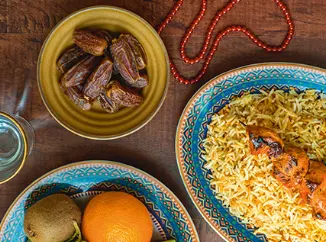Many people make a mistake when they think that nutrition during the blessed month of Ramadan differs from it in the rest of the year. The individual’s nutritional needs in this month do not differ from other months, and the requirements may be lower than they are in reality due to the less muscular effort that the individual expends in this month.
The month of Ramadan has many health and nutritional benefits, including resting the stomach and digestive system, relieving blood pressure, obesity, diabetes, and high cholesterol, so a healthy balance is an important goal. There are many meals or dishes prepared during Ramadan with high calories, so they should be eaten in moderation to avoid any complications that may occurs.
Balanced healthy eating habits during Ramadan Avoid overeating during the Iftar and Suhoor meals and keep a gap between snacks during non-fasting hours. Increase your intake of fruits and vegetables, as they contain a high amount of fiber, water, minerals and vitamins. Delay your suhoor meal; because this helps reduce the feeling of hunger and thirst and helps the fasting person to perform his daily tasks without getting tired or exhausted. Increase your fluid intake that compensates for dehydration because of losing these fluids due to sweat.
Avoid excessive salt intake and all salty and spicy foods, pickles, and canned foods to avoid thirst. Reduce eating heavy and fatty meals because they contain high amounts of calories and fat, which may cause weight gain.
The following are some considerations for eating healthy in Ramadan: Minimize sweets intake and replace it with fruits.
Avoid soft drinks and natural drink juices that may cause indigestion, acidity, and weight gain. Exercise regularly to burn more calories than the body needs and to prevent the accumulation of fats in the body. Ramadan is an opportunity to perform Tarawih prayers.
In addition, practice other sports at appropriate times.
The following are some consideration for eating healthy in Ramadan Start with a few dates, drink a glass of water or Laban to avoid indigestion, and then eat your main meal after a while. Of course, moderation in eating is a main factor to maintain good health.










